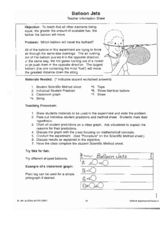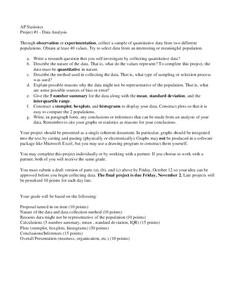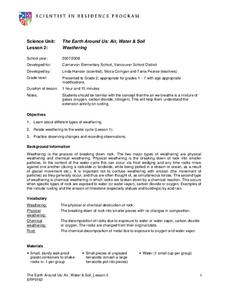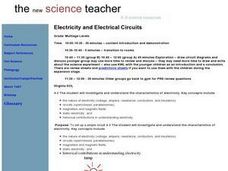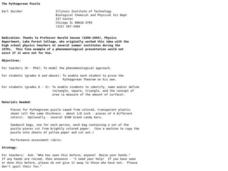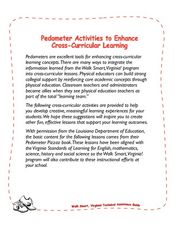Curated OER
Rock Hounds at Heart
Second graders read "Sylvester and the Magic Pebble" by iam Steig and practice describing rocks using different physical properties. They make observations and develop and describe categories such as texture, color, density, hardness, etc.
Curated OER
How to verify the relationship between the wavelength and frequency of light
Students collaborate in heterogeneous groups with each student having a different role. They comprehend the relationship between the frequency and wavelength of light. They record their observations in a table that is included on this...
Drexel University
Learning Roomba Module 3: Controlling Movement
Look at it go. The resource, the third in a series of five using a Roomba, explains the different types of movements a Roomba makes, then challenges pupils to create computer codes that will cause the Roomba to travel specific paths.
Curated OER
Balloon Jets
Young scholars investigate how fuel amount affects the distance traveled by balloons. In this physics lesson, students collect data and create a pictograph. They interpret data and formulate a conclusion.
DiscoverE
Build a Big Wheel
Pasta is great for cooking—and for making Ferris wheels. Aspiring engineers use an assortment of pasta types to create a functioning Ferris wheel. They keep track of the design process to refine their designs, if necessary. Let's hope no...
Curated OER
Aircraft
A variety of concepts are covered in this PowerPoint which gives the main engineering points of different aircraft types. Each slide details the engineering behind non-rigid and rigid categories of lighter or non-lighter than air...
Mathematics Assessment Project
Modeling Motion: Rolling Cups
Connect the size of a rolling cup to the size of circle it makes. Pupils view videos of cups of different sizes rolling in a circle. Using the videos and additional data, they attempt to determine a relationship between cup measurements...
Fort Bend Independent School District
Data Analysis - AP Statistics
What better way to study survey design than to design your own survey! Bring a versatile data analysis project to your AP Statistics class, and encourage them to apply the practices from their instructions to a real-world survey project.
CK-12 Foundation
Measurement of Probability: Basketball Throw
Future mathematicians use an interactive to see how changing the size of a basketball court and the size of a region in the court affects the probability that a ball will randomly fall within the specified region. No calculations are...
American Chemical Society
Diapers: The Inside Story
There shouldn't be any accidents with this activity! An inquiry-based lesson has learners explore the absorption properties of the gel compound in diapers. After testing its properties, they learn the science of the molecules that make...
Curated OER
Crustacean Critters
Young scholars explore the habitats of hermit crabs. In this crustacean lesson, students discover what animals need to survive. Working with live hermit crabs, young scholars explore how hermit crabs have adapted to their habitats.
Curated OER
Weathering
Second graders explore weathering and how the water cycle plays a part in weathering. In this weathering lesson, 2nd graders put gravel and sugar cubes in a jar and shake, simulating weathering. Students use the scientific method to do...
Curated OER
Animals, Animals, Everywhere
Fourth graders participate in a variety of activities dealing with animal characteristics and classifications in this multi-task lesson. They use graphic organizers, make booklets, and make models.
Curated OER
Electricity and Electrical Circuits
Students are introduced to electricity and electrical circuits. In groups, they draw circuit diagrams, complete a KWL chart and discover the difference between open, closed and series circuits. They define new vocabulary and make...
Curated OER
The Mandan Buffalo Dance and You
Students create short oral presentations describing how Native American tribes use dance, poetry, music, art and other expressions to make a dedication to a physical concept or thing.
American Chemical Society
Changing the Density of an Object - Adding Material
In this sixth of seven activities revolving around the concept of density, physical science fans figure out if anything can be done to change the density of an object. Demonstrate by placing a can of regular and a can of diet soda into a...
Curated OER
Inquiry into Consumer Products
High schoolers recognize different consumer products, found in and around the home, that have reactive or denaturing properties when used together. They explore chemical and physical properties of each product by identifying chemical...
Curated OER
# 15 A Search for Automated Plastics Recycling Separation
High schoolers are challenged to investigate the physical and chemical properties of plastics and use them to design a system that could be used to separate them. 1st year chemistry students use density for separation, high schoolers...
Curated OER
Crash Course in Flight
High school physicists demonstrate Bernoulli's Principle by blowing on different items and finding that they do not move in the expected direction! They apply Bernoulli's equation to the flight of an airplane. This well-organized lesson...
Curated OER
Stars and Slopes
More of a math lesson than physics or space science, high schoolers take a set of data and plot it on a log-log coordinate system. The write-up for day two was never completed, but day one, "Stars and Slopes," is complex and cohesive....
Curated OER
Habitat Assessment
Third graders demonstrate the effects of varying environmental components on plants and animals: chemical, physical and biological characteristics of a habitat. They find chemical, physical and biological characteristics of the lake at...
Curated OER
The Pythagorean Puzzle
An engaging hands-on activity is presented. Learners of all ages are addressed in thie unique plan. K-5 learners identify, name, and define a rectangle, square, triangle, and the concept of area. Older learners prove the Pythagorean...
Curated OER
Pedometer Activities to Enhance Cross-curricular Learning
Learners complete different activities involving pedometers such as writing a creative story, calculating step averages, researching pedometers, calculating calories, and much more.
National Nanotechnology Infrastructure Network
Is Measuring an Art or a Science?
Not only do future engineers learn the difference between accuracy and precision, they also get some hands-on experience using different measuring tools.





